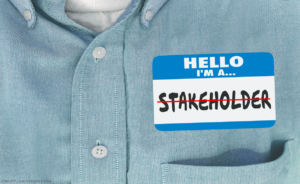 Modern healthcare is, for better or for worse, the hybrid of many different fields—some that are expected, such as biomedical science, and others that are less well appreciated, such as astrology and palmistry. One modern contributor to healthcare is management. Nowadays, we’re inundated with all sorts of jargon from the business and policy worlds: turnover, wait times, downstream effects and more. These all irritate me, but I do occasionally use these terms to express my thoughts. That’s not so with the word stakeholder. You will never hear me use the word stakeholder unironically, even as it is becoming more and more popular. And I’m not alone in this.
Modern healthcare is, for better or for worse, the hybrid of many different fields—some that are expected, such as biomedical science, and others that are less well appreciated, such as astrology and palmistry. One modern contributor to healthcare is management. Nowadays, we’re inundated with all sorts of jargon from the business and policy worlds: turnover, wait times, downstream effects and more. These all irritate me, but I do occasionally use these terms to express my thoughts. That’s not so with the word stakeholder. You will never hear me use the word stakeholder unironically, even as it is becoming more and more popular. And I’m not alone in this.
The term stakeholder is rife with connotations that don’t necessarily align with our current values and has a history that is muddled, to say the least. Perhaps after reading this, you’ll agree. Let’s rheuminate on stakeholders.
Stakeholders in Rheumatology
First, let’s consider who would be considered a stakeholder in rheumatology. Certainly, rheumatology clinicians are stakeholders, as are patients. So too are other members of the healthcare environment, such as funders, clinics, pharmaceutical companies, advocacy organizations and more.
This list would be fairly standard for most specialties. But rheumatology differs slightly in that we don’t own an organ. Therefore, our stakeholders, whatever the term may imply, are more broadly distributed and involve more than people who look at, think about or have a rheumatic disease. Our effects are diffuse and, sometimes, intangible and immeasurable. As we continue to think about the term, let’s keep this in mind.
Staking a Claim to History
Nowadays, we frequently use terms that have the word stake in them: stake a claim, stake out and burned at the stake are examples.1 They are all derived from literal stakes—or poles driven into the ground. The word stakeholders comes from the world of gambling—where the wagers would literally be placed on stakes. The pot would be guaranteed by an independent person, who came to be called the stakeholder.2 Slowly, the term moved from the world of gambling and evolved to become less and less literal, until a stakeholder simply became someone with an interest in an issue.3
In parallel, stakeholder also came to mean “a person holding property or owing an obligation that is claimed by two or more adverse claimants and who has no claim to or interest in the property or obligation.”4 This is particularly relevant with respect to the word’s sensitivity and appropriateness when it comes to people who have historically been dispossessed of these stakes.

